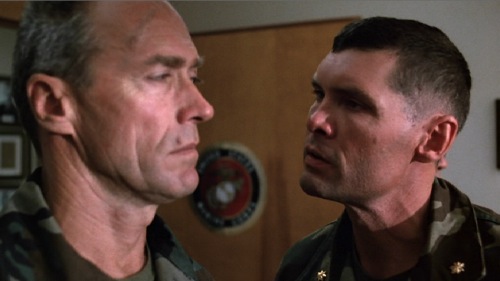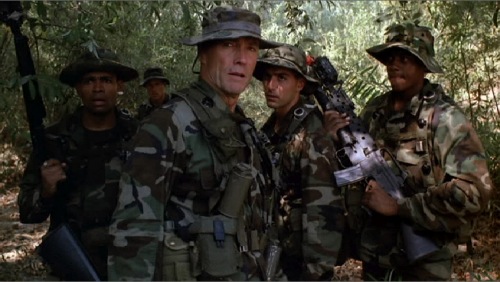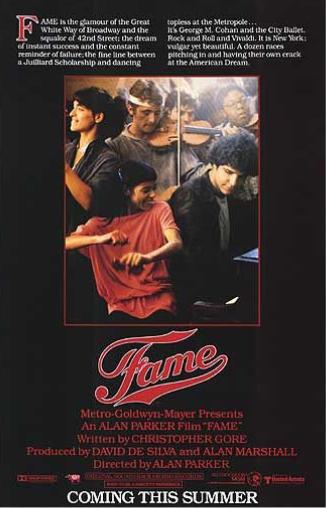On the one hand, it’s a crude, juvenile, and raunchy sex comedy where a bunch of teenagers in 1960s Florida think that it’s a hoot and not at all problematic to spy on the girls shower and to hire a black man to scare all of their (white) friends.
On the other hand, it’s a heartfelt plea for tolerance where Tim (Cyril O’Reilly) finally stands up to his abusive father (Wayne Maunder) and makes friends with Brian Schwartz (Scott Colomby), who is apparently the only Jewish person living in Angel Beach, Florida.
What’s strange about Porky’s is that everyone knows it for being the template for almost every bad high school film that followed, with tons of nudity, jokes about sex, and characters with names like Pee Wee, Miss Honeywell, Cherry Forever, and Porky. But, when you sit down and watch the movie, you discover that, for all the raunchiness, it actually devotes even more time to Brian Schwartz dealing with the local bigots than it does to any of the things that it’s known for. Everyone remembers the shower scene but it’s obvious the film’s heart is with Brian and his attempts to make the world a better place. Porky’s is a sex comedy with a conscience.
Porky’s is an episodic film about a group of teenage boys trying to get laid and also trying to get revenge on the owner of the local brothel. There’s a lot of characters but I’d dare anyone to tell me the difference between Billy, Tommy, and Mickey. I went through the entire movie thinking that Billy was Mickey until I turned on the subtitles and discovered who was who. Porky’s has a reputation for being a terrible movie but it’s actually a pretty accurate depiction of the way that most men like to imagine how their high school years went. It captures the atmosphere of good-spirited teenage hijinks if not the reality.
One of the interesting things about Porky’s is that Bob Clark went from directing this to directing A Christmas Story. The innocence of A Christmas Story might seem like it has nothing in common with raunchiness of Porky’s but, actually, they’re both nostalgic films that are set in an idealized past. (If you still think A Christmas Story has nothing in common with Porky’s, just remember that Ralphie didn’t actually say “fudge.”) Of course, A Christmas Story struggled at the box office and only became a hit when it was released on video while Porky’s is still the most successful Canadian film to ever be released in the U.S. Sex sells. As cool as it was to see Brian Schwartz stand up for himself, I doubt the people who made Porky’s a monster hit were buying their tickets because they had heard the film struck a blow against anti-Semitism. They were going because they knew there was a shower scene.
Porky’s deserves its reputation for being a not-so great movie but I would be lying if I said that I didn’t laugh more than once while watching it. (Of course, I still didn’t laugh as much as the characters in the films laughed. I’ve never seen a cast that was as apparently amused with themselves as the cast of Porky’s.) There’s a lot of bad moments but it’s hard not to crack a smile when Miss Honeywell demonstrates why she’s known as Lassie or when one of the coaches suggests that wanted posters can be hung around the school to help catch the shower voyeur. Plus, everyone learns an important lesson about tolerance and how to destroy a brothel. As bad as it is, it’s hard to really dislike Porky’s.

 The year is 1983 and things are looking bad for the Second Marine Division of the U.S. Marine Corps. The officers are almost all college graduates like Major Powers (Everett McGill) and Lt. Ring (Boyd Gaines), men who have never served in combat but who are convinced that they know what it means to be a Marine in the 80s. Convinced that they will never have to actually fight in a war, the latest batch of recruits is growing soft and weak. All of the slackers have been put in the Recon Platoon, where they are so undisciplined that they think that wannabe rock star Cpl. Jones (Mario Van Peebles) is a good Marine. MARIO VAN PEEBLES!
The year is 1983 and things are looking bad for the Second Marine Division of the U.S. Marine Corps. The officers are almost all college graduates like Major Powers (Everett McGill) and Lt. Ring (Boyd Gaines), men who have never served in combat but who are convinced that they know what it means to be a Marine in the 80s. Convinced that they will never have to actually fight in a war, the latest batch of recruits is growing soft and weak. All of the slackers have been put in the Recon Platoon, where they are so undisciplined that they think that wannabe rock star Cpl. Jones (Mario Van Peebles) is a good Marine. MARIO VAN PEEBLES!

